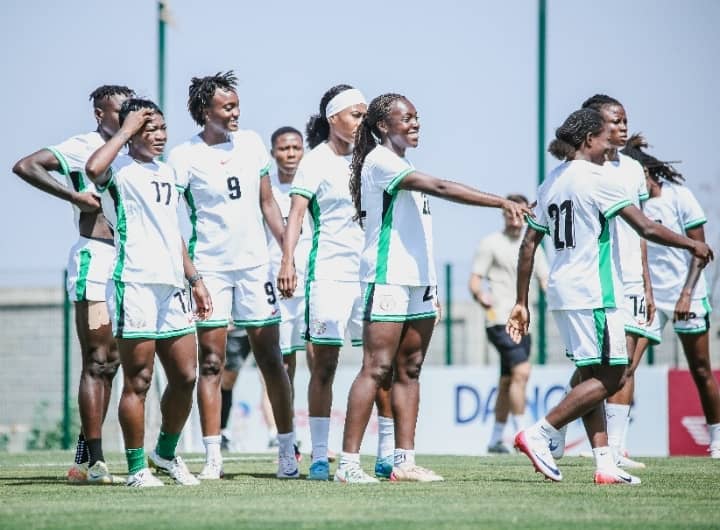Coach Justine Madugu has assured that Nigeria’s Super Falcons have come too far in the ongoing 13th Women’s Africa Cup of Nations (WAFCON 2024) not to reclaim the trophy they had won nine times out of 12 championships.
The Super Falcons, one of only seven teams to have participated in every edition of the FIFA Women’s World Cup finals since the competition began in 1991, overcame the challenge posed by the determined Cup holders, Banyana Banyana of South Africa, in Tuesday’s second semi-final.
The victory was secured, thanks to a spectacular cross-cum-floater goal by defender Michelle Alozie in added time.
“We thank God for making it to the final. I want to assure you that we will not relent or take our eyes off the ball. Our focus is on lifting the trophy in Rabat on Saturday,” Madugu said as the nine-time champions prepared to leave Morocco’s industrial and economic capital, Casablanca, on Thursday afternoon.
“We knew that South Africa, as Cup holders, would be tough, but we were ready for them. I am glad that our tactics paid off. As I said before the tournament, we always assess the opposition first and then determine the tactics that would best suit our purpose.
“We have approached our previous five games in this manner, and we will do the same in the final,” Madugu told thenff.com.
Nigeria will face hosts Morocco at the Olympic Stadium in Rabat at 9pm on Saturday night, in what has been described as the most anticipated match of the 13th Women AFCON.
The final promises to be a clash between a dominant power and one of the emerging forces in women’s football on the continent.
This will be the second time in 17 months that Nigeria will meet the host nation in a major continental final, following the Super Eagles’ encounter with hosts Côte d’Ivoire in the men’s AFCON final in Abidjan in February 2024, with South Africa serving as the previous hurdle.
Captain Rasheedat Ajibade has showcased on-field elegance and resoluteness, supported by the rapid pace and energy of Folasade Ijamilusi, the attacking prowess of Chinwendu Ihezuo, and the spirited play of Esther Okoronkwo and Jennifer Echegini.
Additionally, defender Ashleigh Plumptre has displayed attack-minded play, while goalkeeper Chiamaka Nnadozie (Africa’s Goalkeeper of the Year for two consecutive years) has been nearly impregnable.
Nigeria’s campaign has been impressive, with an extraordinary tally of 11 goals scored and just one conceded—a penalty scored by Linda Motlhalo as the Banyana sought a way back into the game on Tuesday in Casablanca.
It is a long way from 17 October, 1998, when the Falcons triumphed over the Lionesses with an 8-0 victory in a group phase match in Kaduna, at the inaugural edition of what was then known as the African Women Championship.
Nkiru Okosieme, Patience Avre, and Rita Nwadike each scored twice, while Mercy Akide and Florence Omagbemi added one goal each.
Two years later, at the second edition hosted by South Africa, the Falcons once again defeated the Lionesses, this time with a score of 6-0, featuring two goals each from the exceptional Mercy Akide and Kikelomo Ajayi, with one goal each from Maureen Madu and Nwadike.
However, three years ago, as hosts, the Lionesses outperformed the Falcons in the semi-final, winning on penalties after a 1-1 draw in regulation and extra time.
Saturday’s final is set to be played in front of a capacity crowd at the Olympic Stadium—a fitting showcase for the growing profile and steady progress of women’s football on the African continent.





